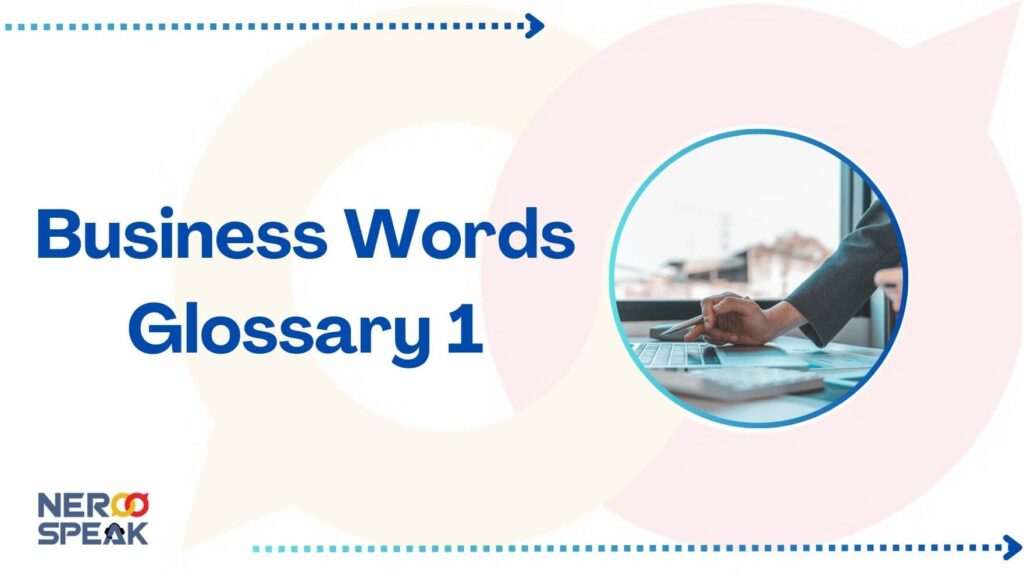A Business Words Glossary is a complete list of words and their meanings often used in business. It guides workers, students, and anyone who wants to learn about business terms and ideas. These glossaries help people understand the language of business.
Before you get a list of business words, let us introduce you to the value of a glossary of business words.
Understanding the Value of a Business Glossary
A business glossary is more than just a list of words used in a field. It is an important tool that helps improve communication, keeps things clear, and helps a business do well. Here’s a look at why a business glossary is valuable for businesses, no matter their size:
1- Promotes Clear Communication
Clear communication is key to avoiding mistakes and confusion in any organization. A business glossary provides clear definitions for important words so that everyone, from team members to stakeholders, understands and uses the terms the same way.
2- Enhances Cross-Team Collaboration
In a team setting, different departments may use the same words in different ways. A “budget” might mean something quite different to the marketing team than it does to the finance team. A business glossary helps fix this issue. It provides shared definitions that everyone understands. This leads to improved teamwork.
3- Supports Decision-Making
Using clear and steady terms is important for making decisions based on data. A business glossary helps teams read reports, KPIs, and analytics correctly. This leads to better and smarter business choices.
4- Facilitates Onboarding and Training
For new employees, learning the company’s terms can feel confusing. A business glossary makes this easier by serving as a helpful guide. It helps new hires quickly understand the words, short forms, and phrases used in the organization.
5- Drives Compliance and Standardization
Many industries have strict rules to follow. A business glossary helps employees understand and follow the important terms, cutting down the chance of not following the rules. It also makes processes clear, which helps during audits and evaluations.
6- Improves Customer Relationships
Clear communication with customers is very important for gaining their trust and loyalty. When everyone at the company uses the same words when talking to customers, it improves the customer experience. It also strengthens the company’s credibility.
7- Boosts Productivity
A business glossary helps remove confusion about terms. This means less time is spent explaining or fixing misunderstandings. With clearer communication, teams can concentrate on their work. This leads to better results and productivity.
8- Strengthens Data Governance
In the age of big data, organizations depend a lot on clear data understanding. A business glossary is important. It defines data-relevant terms so that everyone understands them the same way. This helps to make better data management.
We are here to help you learn – read more now: Best Business English Certificate in 2025

Business Glossary
Here is a list of common business words used in the United States. It includes their meanings and some examples.
- Agenda
A list of items to be discussed at a meeting.
Example: “Please look at the agenda before our team meeting tomorrow.”
- Asset
A standard is a way to measure or compare things.
Example: “The company has things that belong to it, like its buildings, machines, and stock.”
- Benchmark
A standard is a way to measure or compare things.
Example: “We need to compare how well we are doing with top companies in our field.”
- Brand
A product made by a certain company using a specific name.
Example: “Apple is a well-known technology brand.”
- Budget
An estimate of what you will earn and what you will spend for a specific time.
Example: “We must lower expenses to stay in our budget.”
- Client
A person or a group that hires a lawyer or another professional for help.
Example: “We have a meeting with a possible new client tomorrow.”
- Commission
A fee is given to an agent or worker for doing a task or handling a business matter.
Example: “Sales representatives get paid a fee for every sale they make.”
- Compliance
The act of following a desire or order.
Example: “The company is making sure it follows the new environmental rules.”
- Consensus
General agreement among a group of people.
Example: “After talking a lot, the team agreed.”
- Core Competency
A key skill or strength that sets a business apart from its rivals.
Example: “Innovation is a key skill for our company.”
- Deliverable
A physical or non-physical item made from a project, which is meant to be given to a customer.
Example: “The last report is an important part of this project.”
- Equity
The value of the shares issued by a company.
Example: “He owns 30% of the company’s equity.”
- Fiscal Year
A year used for taxes or financial records.
Example: “The fiscal year ends on December 31st.”
- KPI (Key Performance Indicator)
A measurable value shows how well a company is meeting important business goals.
Example: “Customer happiness is an important goal for our team.”
Benefit from these valuable tips about All About Customer Business Emoticon
- Leverage
Using different financial tools or borrowed money can help improve the return on an investment.
Example: “The company plans to use its resources to get more money.”
- Market Share
A part of a market that is managed by a specific company or product.
Example: “Our aim is to grow our market share by 5% this year.”
- Outsource
Get goods or a service from an outside supplier. This is done instead of using a source within the company.
Example: “We chose to hire a special company to help with IT support.”
- Proactive
You are making things happen, in charge of a situation. You cause things to happen instead of waiting for them to happen first.
Example: “We need to actively deal with customer complaints.”
- ROI (Return on Investment)
A performance measure helps us see how well an investment is doing. It can also be used to compare how different investments are performing.
Example: “Our marketing plan gave a great ROI”
- Synergy
The interaction or teamwork of two or more groups, substances, or other agents to create a combined impact that is bigger than what each one could do on its own.
Example: “The merger is expected to create many benefits.”
- Stakeholder
A person who cares about or is interested in something, especially in a business.
Example: “We need to consider the impact on all stakeholders.”
- Sustainability
The ability to stay at a specific rate or level.
Example: “Our company is committed to environmental sustainability.”
- Value Proposition
An innovation, helpful tool, or feature meant to make a company or product appealing to customers.
Example: “Our value proposition is high-quality products at competitive prices.”
- Vision Statement
A company’s road map shows what it aims to be. It helps plan changes by providing a clear path for the company’s growth.
Example: “The vision statement outlines our long-term goals and aspirations.”
- Workflow
The steps that a job goes through from starting to finishing.
Example: “We need to streamline our workflow to improve efficiency.”
These words are often used in business settings. They are important for good communication and understanding in the business world.
We hope you had a good read!!
Important FAQs about business words glossary:
1- What are business glossary terms?
Business glossary terms are clear definitions of important business ideas. They help ensure that everyone in the organization understands the same thing.
2- What is a business vocabulary?
A business vocabulary is a group of words and phrases used in business. These include terms used for operations, finance, marketing, and management.
3- What are some words that describe business?
Some words that describe business are profit, strategy, growth, innovation, leadership, networking, investment, and good practice.
4- What are the terms of business?
Terms of business are the rules, policies, or conditions that guide how a company runs. This includes payment terms, delivery times, and return policies.
Ready to grow? Check out today’s latest articles on our website NerooSpeak!
- All About Chief Business Officer (CBO)
- Improve Your Career by Learning Professional English
- Improve Through English Communication Skills Courses
- Best Online English Class Recommend

Ali Mohammad is a SEO Specialist, Content Writer, and WEB Developer with over 4 years of experience in WEB. He has a strong background in Content Writing gained through SEO Companies. He holds a Master Degree in Communications Engineering from Tishreen University and is a certified professional. Ali is passionate about Business and Engineering and enjoys helping readers by sharing his knowledge.